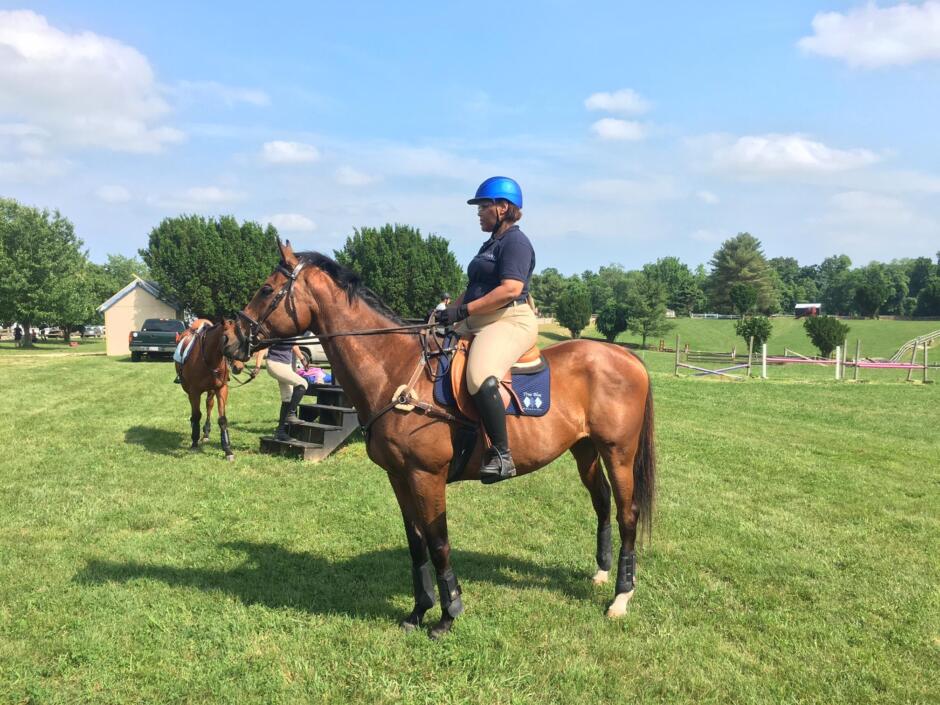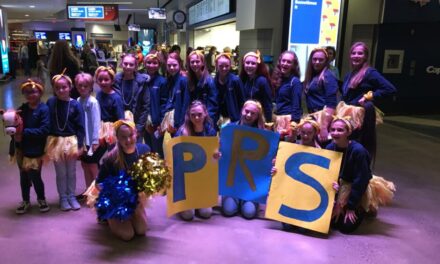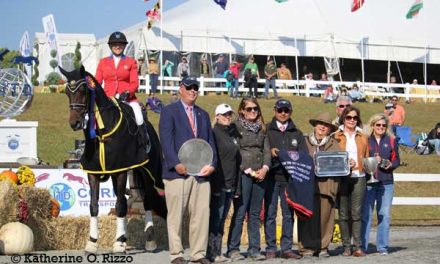by Katherine O. Rizzo (first published in the October 2020 Equiery)
In the September News & Views section of The Equiery we reported on Nation Media’s Diversity Scholarship. This month, we have followed up with the three Maryland scholarship winners asking them to share their stories on why they applied for the scholarship and what sort of feedback they have received since their stories were published on eventingnation.com.
Each woman represents different backgrounds, different experiences and different view points, but together, along with all 21 scholarship winners, they offer first steps towards a more inclusive competitive horse world.
Helen Casteel
Helen Casteel of Silver Spring first sat on a horse as a teenager in Massachusetts when she followed a friend to a local barn and started taking lessons. “My dad was a mailman and would pick me up after school in his mail truck and drop me at the barn for lessons,” she said with a chuckle. “I just liked horses and wouldn’t let it go. The place was an eventing barn and I just loved it!”
Casteel did not actively start competing in eventing until much later in life when she purchased her first horse and began boarding at Waredaca in Laytonsville. “That’s when I got serious about the sport,” she said. “I’m not a professional [eventer] in any way, but that’s ok.” Casteel has competed at many different Area II venues, rode at the 2019 American Eventing Championships in Kentucky and spent part of this past winter in Florida.
Casteel stated in her scholarship essay that she feels “very fortunate in my experiences as a Black woman in the horse worlds and specifically as an Eventer. I’ve always ridden at racially diverse barns and am based now at a place where I’ve only felt welcome and safe as I train and compete.” Casteel went on to write that “being the one that looks different from everyone else is something I’ve gotten used to but I’m lucky to not have to worry too much about it. Unfortunately, not all other BIPOC in equestrian sport have been as lucky as I have.”
This is the reason why she decided to apply for the Diversity Scholarship. “When I first heard about it, I wasn’t going to do the essay,” she said. “This [diversity issue] has been happening for years and it has been very easy for most people, as in white people, to not think about it. I started to think ‘come on guys, you knew these things were going on and haven’t done anything about it.’”
So Casteel began to write her essay, not so much for the scholarship money but because of the platform being offered to speak out on the issue of diversity. “This scholarship idea was a good way to get more people to come forward and share their thoughts,” she added.
Overall the feedback Casteel has received since being one of this year’s winners has been positive. “Everyone has been lovely,” she said, adding, “People I haven’t heard from in a while have reached out to me because of the essay.” One such friend told her, “having this come from you made me think of things a bit differently,” which Casteel feels is the perfect starting point, stating that thoughts on diversity need to change.
Looking back at her essay, Casteel does wish she had spent more time talking about the history of Black Americans in shaping the horse world across the country. “I could have talked so much more about Bass Reeves. I mean he IS the Lone Ranger,” she stated. “The Black community’s contribution to the horse world across the country is so much more than people think.” It is changing the way people think about minorities and horses that will begin to make a difference.
But as Casteel stated in the conclusion of her essay, “However real change will only happen when white people truly prioritize diversity and representation efforts. This has to become your problem to solve.”
Dawn Edgerton-Cameron
As a young girl growing up in Queens, New York, all Dawn Edgerton-Cameron really wanted was a cat. “I don’t know why, but I just kept begging my parents for a cat and read all the books on cats I could find,” she remembered. “And then I moved onto dogs but the answer was still always no.”
Somewhere along the line, Edgerton-Cameron’s animal obsession turned to horses and her parents said no to buying a horse but after her family moved to Long Island, NY, she was able to start taking some riding lessons. “I think they liked the idea that the horses couldn’t actually come live with us,” she said with a laugh.
The first barn she rode at taught Western so that is where her equestrian journey started. She eventually moved to a hunt seat barn and then road for Brown University’s Intercollegiate Horse Show Association team. “I remember the exact moment I learned about [the sport of] Eventing,” she said, “It was watching the 1984 Olympics. I just really loved the idea of being able to do a sport where you got out of the ring.”
Now living in Annapolis, Edgerton-Cameron jumped head first into the Area II eventing scene while dabbling in competitive trail riding with her trainer’s, Dyanna Capuano, off-the-track Thoroughbred.
Edgerton-Cameron also was hesitant to write a scholarship essay at first. “I had been watching the comments online and I don’t mean this to be harsh but with my busy schedule, I just didn’t feel the scholarship amount was worth the time,” she explained. Edgerton-Cameron is a financial advisor currently working on transitioning to starting her own firm. “I just knew if I was going to write anything, it would end up being a long commitment because I wanted to not just address the problem at hand but give a way through to achieve an end goal,” she added.
As more and more sponsors added their support to the scholarship fund, Capuano kept pushing her student to share her story. “Fourteen hours and five pages later I had my thoughts written down,” Edgerton-Cameron said with a chuckle. “And even now as I re-read what I sent in, I keep wanting to add to it and change a word here and there.”
Edgerton-Cameron’s essay reads exactly as she intended. Looking at the issue of diversity from an MBA mindset, she addressed four key factors and lists many ways to “fix” each factor. The key factors she lists in her essay are exposure, opportunity, perception and reception. “I wanted to bring something to the table that was more than just my personal experiences. I wanted to be able to share some solutions,” she said.
Presenting solutions is what most motivated Edgerton-Cameron to submit an essay saying, “we need steps on how individual horse people can move forward and make a difference.”
Edgerton-Cameron received feedback immediately from Eventing Nation Editor-In-Chief Leslie Wylie before the essay was ever formally published. “Leslie sent me an email back saying ‘I just read your essay four times’ and ‘wow’,” Edgerton-Cameron shared.
Once posted online, Edgerton-Cameron stated the feedback has started more and more conversations. She herself is even learning more about other people of color in equestrian sports. “I’ve learned just how many riders of color there are in this sport. I am not alone!” she explained, adding, “there is an entire community out there spread out across the country!”
On a personal level, Edgerton-Cameron has joined several Facebook groups related to riders of color since the scholarship was announced. “If we continue to come together, we can really make a difference,” she said. Edgerton-Cameron also added, “I really do mean what I wrote in that essay about wanting to join committees addressing this area of conversation. I’m here and willing to do my part.”
Lea Jih-Vieira
Seeing as how this Diversity Scholarship was first announced on Eventing Nation’s website, polo player Lea Jih-Vieira did not think she was eligible to apply. “I get the EN emails and saw one that said ‘scholarship’ and clicked through,” she said. “It was interesting to find out that [the scholarship] was open to all disciplines, not just eventing.”
Jih-Vieira, who is of Chinese and Portuguese decent, remarked that as a child, her mother really wanted her to join some sort of sport. “She tried everything… soccer, softball… I just would sit down and refuse to play,” she said. “Then she signed me up for a riding lesson and I just loved it!”
Her riding beginning was at a show hunter barn but then she tried polo briefly before getting into barrel racing. “Then in high school I started riding polo with Mountain View Polo and just stuck with it,” she stated. “I’m 100% a polo player now!”
Now playing varsity polo at Cornell University as a sophomore, the Middletown native said, “I personally haven’t seen many Asian players in polo. They are mostly white and then Hispanic. I can count on one hand how many Asian polo players I’ve seen.”
Jih-Vieira addressed in her essay the financial divide that is present in polo as well as many other equestrian sports. “Equestrian sports in general are expensive and to be really competitive in polo, you really need a string of good horses, which just triples the expenses,” she explained. “This is why I really wanted to focus on the socioeconomic problems with the sport in general.”
In her essay, she wrote, “The underlying issue why we have a lack of diversity in equestrian sport amounts to a socioeconomic issue. The historic systems in place, meant to limit people of color, are so interwoven in the fabric of our country that we may not even realize how much they influence our lives today.” She also wrote, “To make equestrian sport more inclusive, we must be mindful of the struggles of these communities.”
Jih-Vieira put out a challenge of sorts to organizations such as the U.S. Eventing Association and U.S. Polo Association to do their part in breaking down barriers for low-income individuals entering the sport. She suggested, “By allocating money to help this population of aspiring equestrians start their careers, these organizations are not only supporting these individuals, but are setting an example for everyone in the community.”
She told The Equiery, “I know there were a lot of comments on Facebook criticizing the amount of this scholarship but the thought is good and they needed to start somewhere.”
Diversity Scholarship Follow Up
After the above initial interviews were conducted, the owner of the Plantation Field in Unionville, PA, canceled the lease of the property held by Plantation Field Equestrian Events, Inc., stating they were terminating the running of horse trials at their property due to pressure received from Eventing Nation and USEA to change the name of the farm and event.
According to Denis Glaccum, President of Plantation Field Equestrian Events, Inc., the word “Plantation” in this case refers to the long history the farm has with trees and hedges being planted in the fields by a local Boy Scout troop. Glaccum stated in a September 16 press release, “Colonial Pennsylvania considered properties less than 100 acres a farm and properties with more than 100 acres a plantation. There is no reference to race in this definition. The Unionville area is historically a Quaker community. The Quakers were one of the earliest abolitionist groups and fought against slavery. This area was also part of the underground railroad.”
USEA CEO Rob Burk and USEA President Max Corcoran issued the following joint statement on behalf of the USEA on September 17, “Having this historic competition close isn’t the right result for the sport, and the United States Eventing Association (USEA) is working hard to find a solution. The organizer and landowners operate exceptional events on a beautiful piece of land. We are deeply sensitive to the history of the word “plantation” and its connection to slavery; however, this property has no known connections to slavery and was instead named after ‘plantings’ on the property. We understand that neither the organizer nor the landowners have ever intended to cause any discomfort related to the name of the event and to imply otherwise is a disservice to our organizers, landowners, and our sport. The USEA does not have the ability to require an event to change its name as we are required to carry the US Equestrian (USEF) licensed name of the competition on our calendar of events. However, we are hopeful that an acceptable solution to this issue can be reached.”
In response to the issue over Plantation Field, Helen Casteel, one of the scholarship winners interviewed for The Equiery’s October article, wrote a letter to Eventing Nation’s Editor-in-Chief, Leslie Wylie, asking if any people of color in the eventing community were involved with the decision to approach the owners and campaign to change the name. In her letter, Casteel suggested, “Instead of pushing for the name change and having the conflict with organizers and owners escalate, I would have requested a simple paragraph be permanently placed on the website, show brochure and any other official publication noting the history of the word ‘Plantation’ in this country; explaining the actual meaning behind the name ‘Plantation Field’ along with clear statement that all races, genders, and religions are welcome.”
In addition, Casteel wrote in her letter, “On a personal level, this situation puts me in an uncomfortable position. My horse is recovering from an injury so we aren’t doing any recognized horse trials this year. Next year I’m worried that people will look at me at shows and think I’m part of the reason Plantation Field isn’t running anymore. I’m now feeling more like an outsider than I ever have.”
Dawn Edgerton-Cameron, also featured in the October Equiery article, issued the following statement to The Equiery, “Regarding the recent developments surrounding the Unionville event. I think it’s sad that rather than engage in a dialog that considers how one’s brand is viewed through the lens of both current events and historical context as others have done recently (i.e., Brown and Cornell Universities, the state of Rhode Island), that the leadership of one of the premier events in the nation instead chose to throw a temper tantrum. The former approach would have uplifted not only their status as leaders on the issue they say they care about and positioned them, I believe, on the right side of history.
“Instead, while this is a temporary blow to Area II and the surrounding areas, I am confident that the eventing community will establish another in its place as they have when other iconic events have shut down. In the meantime, if we are to move ahead as a community and as a society, we need to be willing to have difficult conversations on sensitive topics in a civil matter, and without knee-jerk reactions. In the meantime, let us all remember that words matter. Representation matters. Thoughtfulness matters.”














